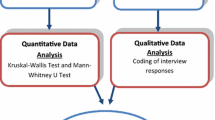Abstract
The negative attitudes of some student teachers towards mathematics and the inadequacy of their mathematical backgrounds have been a concern of mathematics educators for many years. In an attempt to understand the interaction of cognitive and affective factors in mathematics learning, this paper presents a case study of one preservice early childhood/primary teacher education student’s experiences of learning mathematics. The study identifies issues which are of concern both to teachers and to teacher educators.
Similar content being viewed by others
References
Bar-Tal, D. (1978). Attributional analysis of achievement-related behaviour.Review of Educational Research, 48(2), 259–271.
Buerk, D. (1985). The voices of women making meaning in mathematics.Journal of Education, 167(3), 59–70.
Buxton, L. (1981).Do you panic about maths? Coping with maths anxiety. London: Heinemann Educational Books.
Chapman, O. (1993). Facilitating in-service mathematics teachers self-development. In I. Hirabayashi, N. Nohda, K. Shigematsu & F.-L. Lin (Eds.),Proceedings of the 17th International Conference of Psychology of Mathematics Education (Vol. I, pp. 228–235). Japan: International Group for the Psychology of Mathematics Education.
Corsini, R. (Ed.). (1984).Encyclopedia of psychology (Vol. 1). New York: Wiley.
Evans, J. T. (1987). Anxiety and performance in practical maths at tertiary level: A report of research in progress. In J. C. Bergeron, N. Herscovics & C. Kieran (Eds.),Proceedings of the Eleventh International Conference on the Psychology of Mathematics Education (Vol. I, pp. 92–98). Montreal: International Group for the Psychology of Mathematics Education.
Fennema, E. (1989). The study of affect and mathematics: A proposed generic model for research. In D. B. McLeod, & V. M. Adams (Eds.),Affect and mathematical problem solving (pp. 206–219). New York: Springer-Verlag.
Hart, K. (1993). Confidence in success. In I. Hirabayashi, N. Nohda, K. Shigematsu & F.-L Lin (Eds.),Proceedings of the 17th International Conference of Psychology of Mathematics Education (Vol. I, pp. 17–31). Japan: International Group for the Psychology of Mathematics Education.
Hart, L. E.. (1989). Describing the affective domain: Saying what we mean. In McLeod, D. B. & Adams, V. M.. (Eds.),Affect and mathematical problem solving (pp. 37–45). New York: Springer-Verlag;
Hembree, R. (1990). The nature, effects and relief of mathematics anxiety.Journal for Research in Mathematics Education, 21(1), 33–46
Hoyles, C. (1982) The pupils’ view of mathematics learning. InEducational Studies in Mathematics, 13(4), 349–369.
Leder, G. (1993). Reconciling affective and cognitive aspects of mathematics learning: Reality or a pious hope? In I. Hirabayashi, N. Nohda, K. Shigematsu & F.-L. Lin (Eds.),Proceedings of the 17th International Conference of Psychology of Mathematics Education (Vol. I, pp. 46–65). Japan: International Group for the Psychology of Mathematics Education.
Mandler, G. (1989). Affect and learning: Cause and consequences of emotional interactions. In McLeod, D. B.. & Adams, V. M.. (Eds.),Affect and mathematical problem solving (pp. 3–19). New York: Springer-Verlag.
Marton, F. (1993, April).Phenomenography. (A paper prepared for publication in International Encyclopedia of Education) Paper presented at a research seminar at Royal Melbourne Institute of Education.
McLeod, D. B.. (1992). Research on affect in mathematics education: A reconceptualisation. In D. A. Grouws (Ed.),Handbook of research on mathematics teaching and learning (pp. 575–596). New York: Macmillan Publishing Company.
Schoenfeld, A. (1985).Mathematical problem solving. California: Academic Press.
Skemp, R. (1979).Intelligence, learning and action. Chichester: Wiley and Sons.
Author information
Authors and Affiliations
Rights and permissions
About this article
Cite this article
Carroll, J. What makes a person mathsphobic? a case study investigating affective, cognitive and social aspects of a trainee teacher’s mathematical understanding and thinking. Math Ed Res J 6, 131–143 (1994). https://doi.org/10.1007/BF03217268
Issue Date:
DOI: https://doi.org/10.1007/BF03217268




